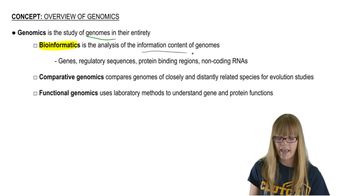Table of contents
- 1. Introduction to Genetics51m
- 2. Mendel's Laws of Inheritance3h 37m
- 3. Extensions to Mendelian Inheritance2h 41m
- 4. Genetic Mapping and Linkage2h 28m
- 5. Genetics of Bacteria and Viruses1h 21m
- 6. Chromosomal Variation1h 48m
- 7. DNA and Chromosome Structure56m
- 8. DNA Replication1h 10m
- 9. Mitosis and Meiosis1h 34m
- 10. Transcription1h 0m
- 11. Translation58m
- 12. Gene Regulation in Prokaryotes1h 19m
- 13. Gene Regulation in Eukaryotes44m
- 14. Genetic Control of Development44m
- 15. Genomes and Genomics1h 50m
- 16. Transposable Elements47m
- 17. Mutation, Repair, and Recombination1h 6m
- 18. Molecular Genetic Tools19m
- 19. Cancer Genetics29m
- 20. Quantitative Genetics1h 26m
- 21. Population Genetics50m
- 22. Evolutionary Genetics29m
1. Introduction to Genetics
Modern Genetics
Problem 31d
Textbook Question
In certain cases, genetic testing can identify mutant alleles that greatly increase a person's chance of developing a disease such as breast cancer or colon cancer. Between 50 and 70% of people with these particular mutations will develop cancer, but the rest will not. Imagine you are either a 30-year-old woman with a family history of breast cancer or a 30-year-old man with a family history of colon cancer (choose one). Each person can undergo genetic testing to identify a mutation that greatly increases susceptibility to the disease. Putting yourself in the place of the person you have chosen, provide answers to the following questions.
If you have a spouse or partner, are you obligated to tell that person the result of the genetic test? Why or why not?
 Verified step by step guidance
Verified step by step guidance1
<insert step 1> Consider the ethical implications of genetic testing and the importance of communication in relationships.
<insert step 2> Reflect on the potential impact of the test results on your partner, including emotional, psychological, and future planning aspects.
<insert step 3> Evaluate the principles of autonomy and privacy in healthcare, and how they apply to sharing personal genetic information.
<insert step 4> Consider the potential benefits of sharing the information, such as mutual support and informed decision-making regarding health and family planning.
<insert step 5> Weigh the potential risks of not sharing the information, such as lack of support or misunderstanding, against the right to privacy.
Recommended similar problem, with video answer:
 Verified Solution
Verified SolutionThis video solution was recommended by our tutors as helpful for the problem above
Video duration:
1mPlay a video:
Was this helpful?
Key Concepts
Here are the essential concepts you must grasp in order to answer the question correctly.
Genetic Testing
Genetic testing involves analyzing an individual's DNA to identify mutations or variations that may indicate a predisposition to certain diseases. This process can reveal the presence of mutant alleles associated with increased risks for conditions like breast or colon cancer. Understanding the implications of these results is crucial, as they can influence personal health decisions and family planning.
Recommended video:
Guided course

History of Genetics
Informed Consent and Disclosure
Informed consent is the process by which individuals are educated about the risks, benefits, and implications of genetic testing before undergoing the procedure. Disclosure refers to the ethical obligation to share test results with relevant parties, such as a spouse or partner, especially when the information could impact their health decisions or familial risk. Balancing personal privacy with the duty to inform is a key ethical consideration.
Recommended video:
Guided course

Genomics Overview
Genetic Predisposition vs. Penetrance
Genetic predisposition refers to an increased likelihood of developing a disease based on genetic factors, while penetrance describes the proportion of individuals with a specific mutation who actually exhibit the disease. In the context of the question, understanding that not everyone with a mutation will develop cancer (50-70% penetrance) is essential for evaluating the implications of test results and the decision to disclose them to a partner.
Recommended video:
Guided course

Penetrance and Expressivity

 9:08m
9:08mWatch next
Master Modern Genetics with a bite sized video explanation from Kylia Goodner
Start learningRelated Videos
Related Practice


